The Mysterious Side of Each Myers-Briggs® Personality Type
Each of us has a little mystery inside, whether others realize it or not. Some of us keep a lot of inner feeling and passion inside while others have a complex inner world of logical principles and connections inside. Every person has a million nuances that make them unique; some related to personality and some not. Today we’re taking a look at why each of the 16 Myers-Briggs® is mysterious. Let’s get started!
Not sure what your personality type is? Take our new personality questionnaire here. Or you can take the official MBTI® here.

Table of contents
Estimated reading time: 19 minutes
The Mysterious Side of Each Myers-Briggs® Personality Type
The ENFP
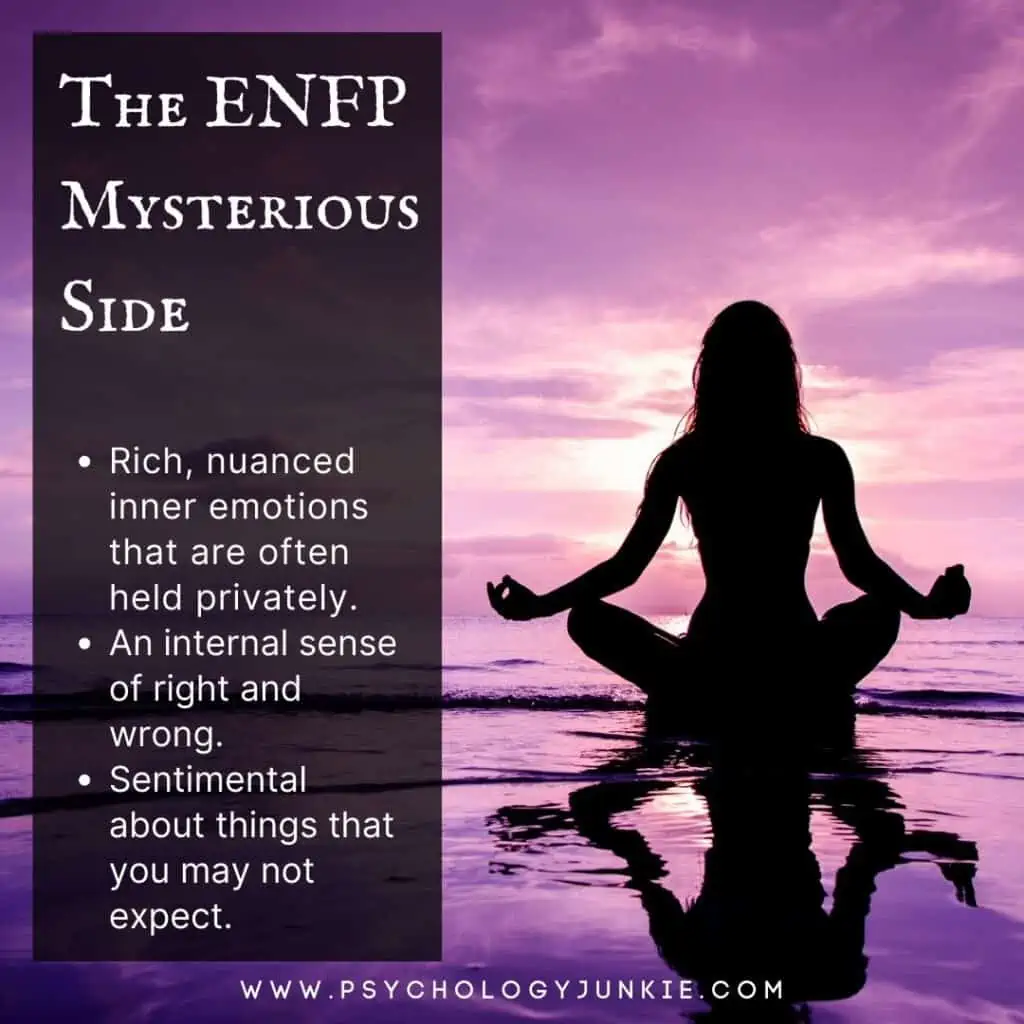
While the world outside often sees the ENFP as a veritable wellspring of ideas and enthusiasm, there’s much more depth to this type than initially meets the eye. The ENFP has an inner landscape of nuanced emotions and insights that are rarely verbalized. One might find in an ENFP’s room scrapbooks and notebooks filled with profound thoughts about the human condition, about one’s own relationship with morality, along with poems about grief, love, birth, or death. Ultimately, while ENFPs show the world their ideas and possibilities, they often keep a mysterious inner world of complex inner emotions and insights more hidden except to a select few. This type craves a life of depth and meaning rather than a life of frivolity and shallow fun. You may think you know an ENFP inside and out based on their outward expressions and seeming openness, only to realize later you’d barely scratched the surface of who they were.
Read This Next: 24 Signs That You’re an ENFP, The Visionary Personality Type
The ENTP
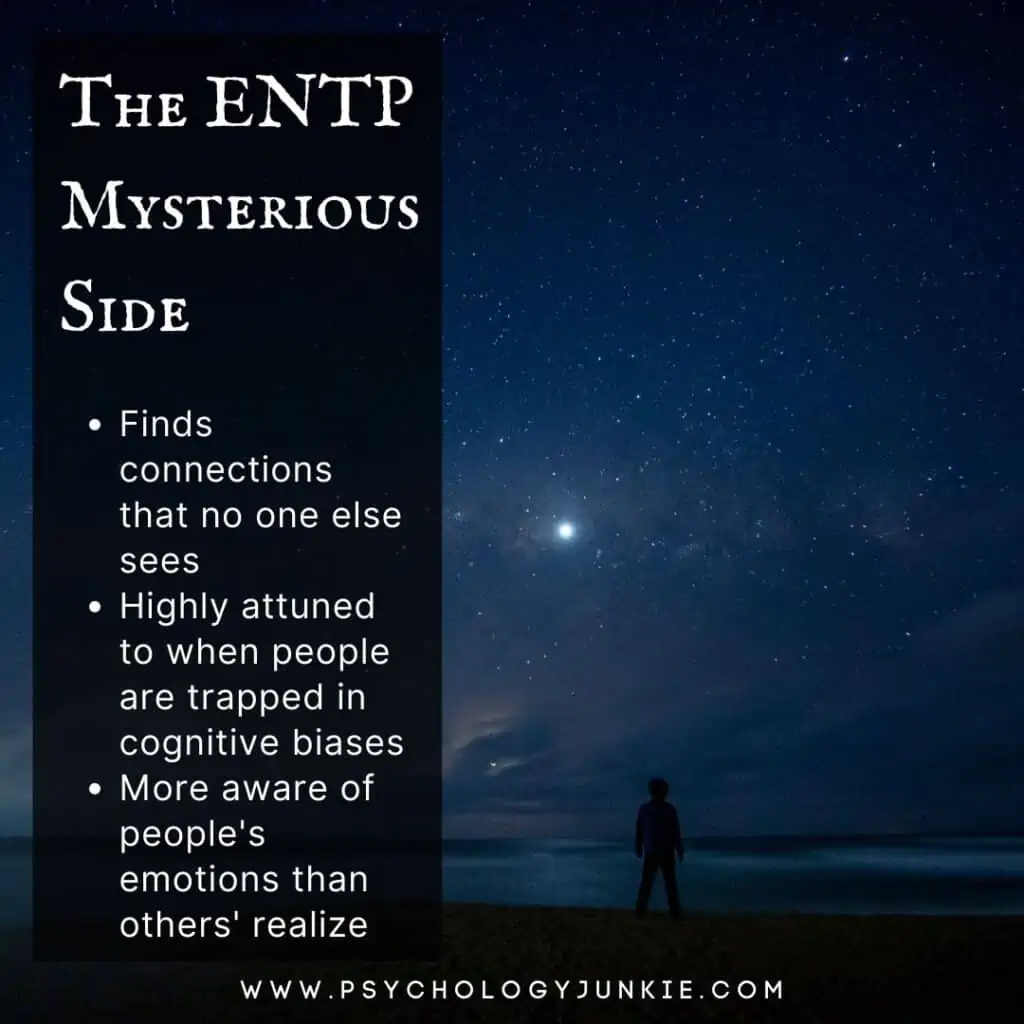
Visionary and often brilliant, ENTPs bring the world a multitude of ideas an suggestions. Logical dreamers, they strive to push the boundaries of what’s possible. But while their impulsivity and talkativeness is evident, there’s more going on under the surface than most people realize. Deeply analytical, these types are compelled to understand complex topics or phenomena for which there is no explanation or thorough understanding. They find relationships between systems, analyze situations from many different angles, and look for patterns and original conclusions. And while ENTPs may seem argumentative and bold, they have an inner sensitivity that many people don’t realize is there. They can often read people’s emotions fairly easily and will go out of their ways to help people who are struggling. They can be surprisingly embarrassed during situations where their social credibility falters or when others make social faux pas. But many people are completely unaware of this sensitivity!
Read This Next: 10 Things You Should Never Say to an ENTP
The INFP
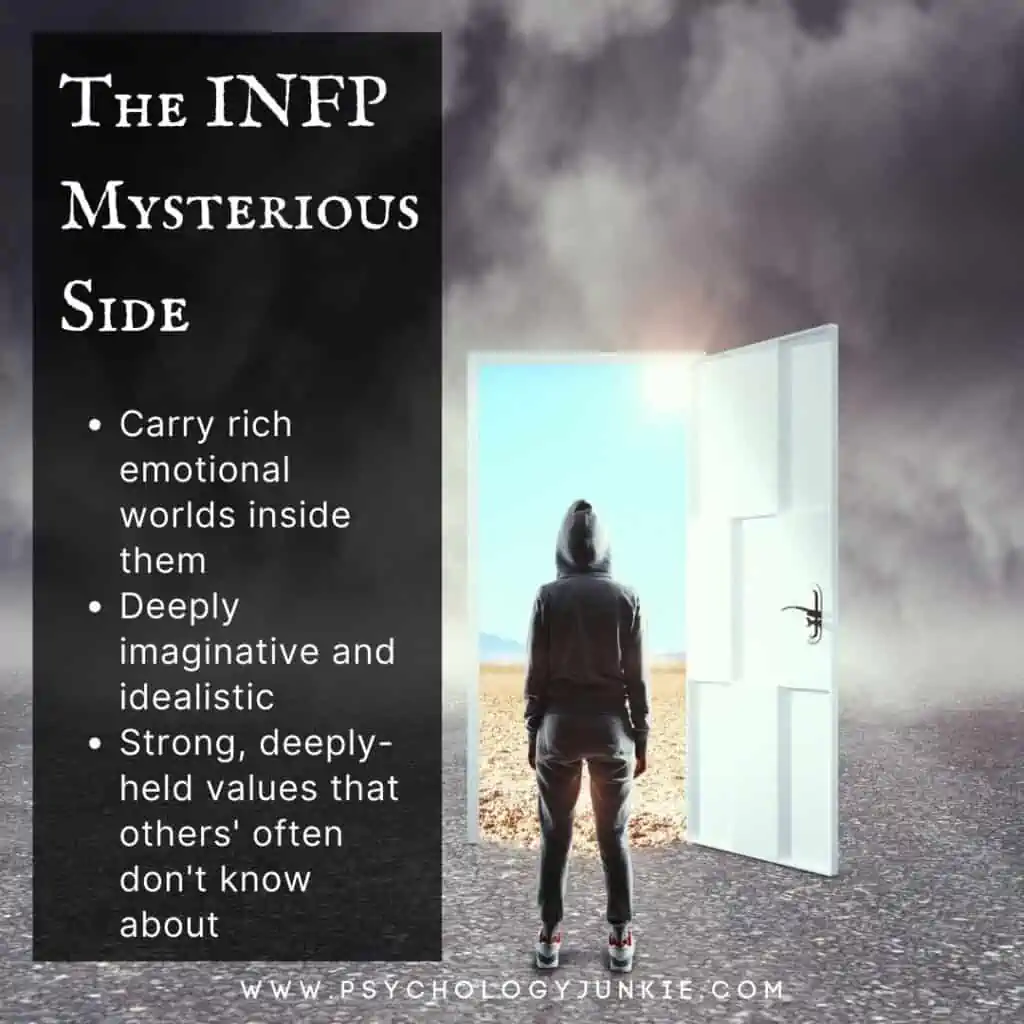
There’s often an air of mystery surrounding the INFP personality type. Their quiet exterior and inward focus can make them seem disengaged or even aloof. But what is happening inside the mind of the INFP is usually a rich inner world of fantasy, emotion, and imagination. These types are highly creative people who often have strong opinions about social issues and the human condition. These opinions and feelings may show up in artistic expression; paintings, poetry, or performance. They often feel things deeply and can be very idealistic in their beliefs. To the INFP depth rather than achievement is the goal. Meaning rather than material wealth. Though they are quiet people, they usually have a lot to say – if you can get them to open up. They just have to know they can trust you with the wealth and richness of their ideas.
Read This Next: INFPs and Their Compatibility with Every Myers-Briggs® Personality Type
The INTP
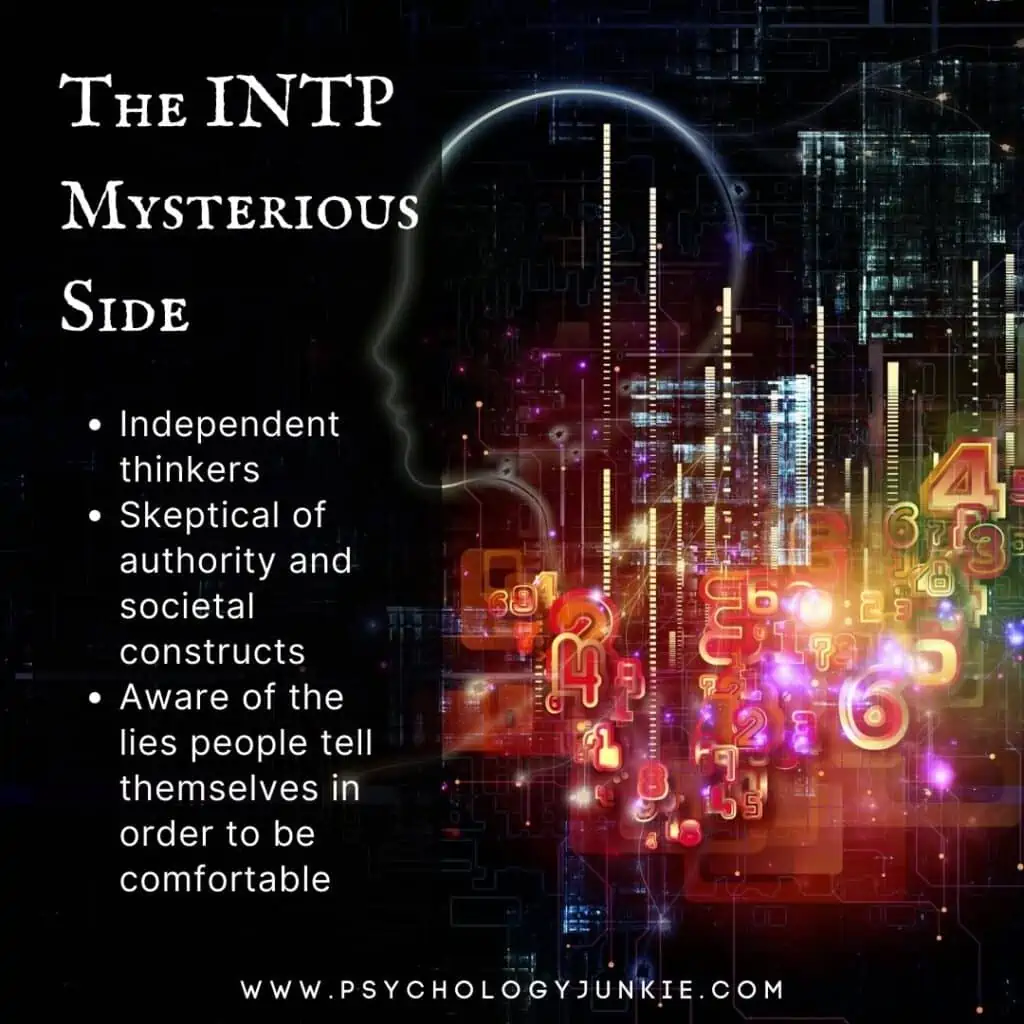
Quiet and studious, INTPs are easily written off by other people who are lazy in their assessments of the type. While they may seem outwardly disorganized and quirky, on the inside they are deeply intuitive, imaginative, and thoughtful. These types have the unique ability to disentangle confusing, mind-boggling problems that stump other types. The more complicated the problem, the more an INTP can dig in and find original solutions (if they care about the problem in question). When there isn’t evidence or pre-established solutions, INTPs harness their imagination to reveal insights and possibilities that are often ingenious. Patient and thorough, INTPs think independently and care little to keep up with the rules of institutions or authorities.
When it comes to social relationships, INTPs may seem hard to read or detached, but they can be surprisingly sensitive about the emotional world they’re in. These types dislike heavy, tense, or confrontational situations. They have a crucial need for independence and emotional space and can feel overwhelmed and tormented when surrounded by people who are emotionally intense, reactive, or easily angered.
Read This Next: A Look at the INTP Leader
The ENFJ
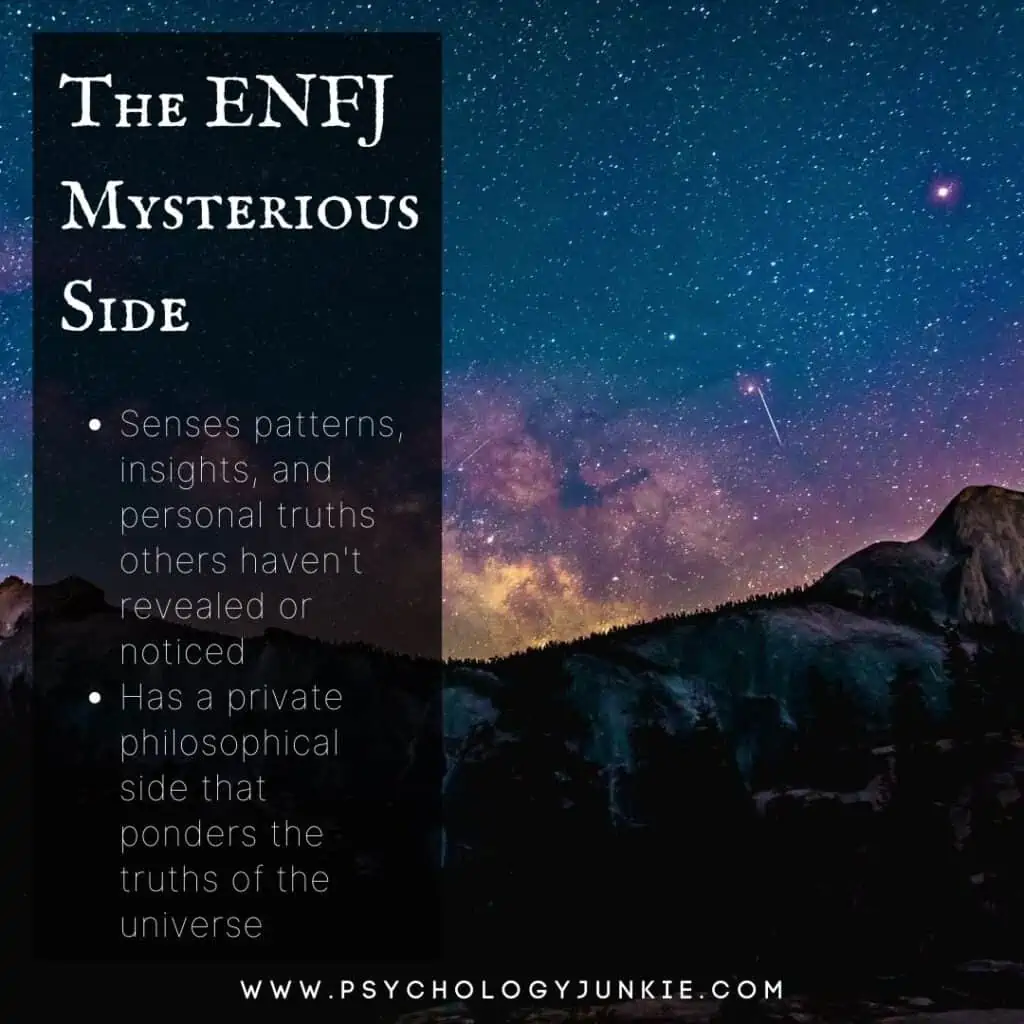
Most people see the ENFJ as an inspiring and motivating influence. These types are natural leaders who often put the needs of others above their own. They’re gifted at reading other people’s emotions and can be very persuasive when it comes to getting people to see their point of view. However, there’s often more going on beneath the surface than meets the eye. ENFJs are very compassionate people who often feel the pain of others deeply. They can be highly sensitive to criticism and, though they may not ask for it directly, desire regular affirmation that they’re doing the right things in life. They also have a strong need for close, intimate relationships and can feel lost and lonely when they’re not connected to other people.
As intuitives, ENFJs have an inner philosophical side that compels them to think deeply about people and situations. Big picture questions fill their mind, like “What is the meaning of life?” “What is the nature of love?” or “How can we make the world a better place?” In the quiet of their alone time they often sink into the depths of their imagination, being pulled by images and symbols of an otherworldly fashion. During these times they often unravel mysteries about human relationships, dynamics, and what motivates people.
Read This Next: The ENFJ Personality Type and the Enneagram
The ENTJ
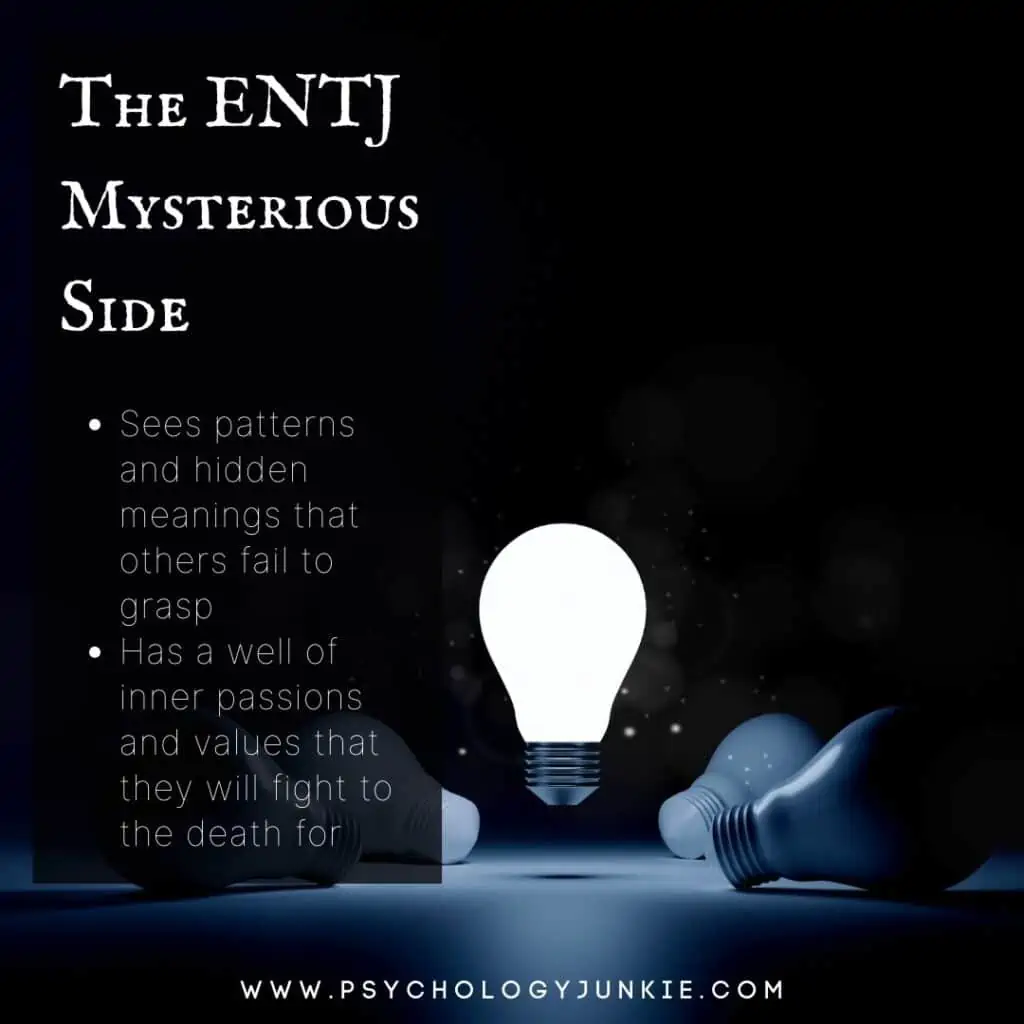
The ENTJ is one of the rarest personality types and, as such, is often misunderstood. These types are natural leaders who possess a strong vision for the future. They’re highly analytical and logical people who are able to see all the moving parts of a situation and figure out how they fit together. This ability, along with their boldness and charisma, allows them to be very persuasive when it comes to getting people to buy into their ideas. ENTJs are often drawn to positions of power and influence and have a natural talent for leading and motivating others.
However, there is more to the ENTJ than one gathers at first glance. As intuitives, they feel a tremendous pull to understand the mysteries of the universe. They know that everything in life is part of a pattern, and they aim to grasp that grand pattern in order to find meaning and purpose. And while ENTJs may seem blunt and unfeeling to others, inwardly they can be surprisingly sensitive and passionate. Their values are often deeply held and you might be surprised to find that an ENTJ you had previously labeled as “insensitive” is deeply passionate and proactive in supporting a humanitarian cause or charity program.
Read This Next: 10 Things You Should Never Say to an ENTJ
The INFJ
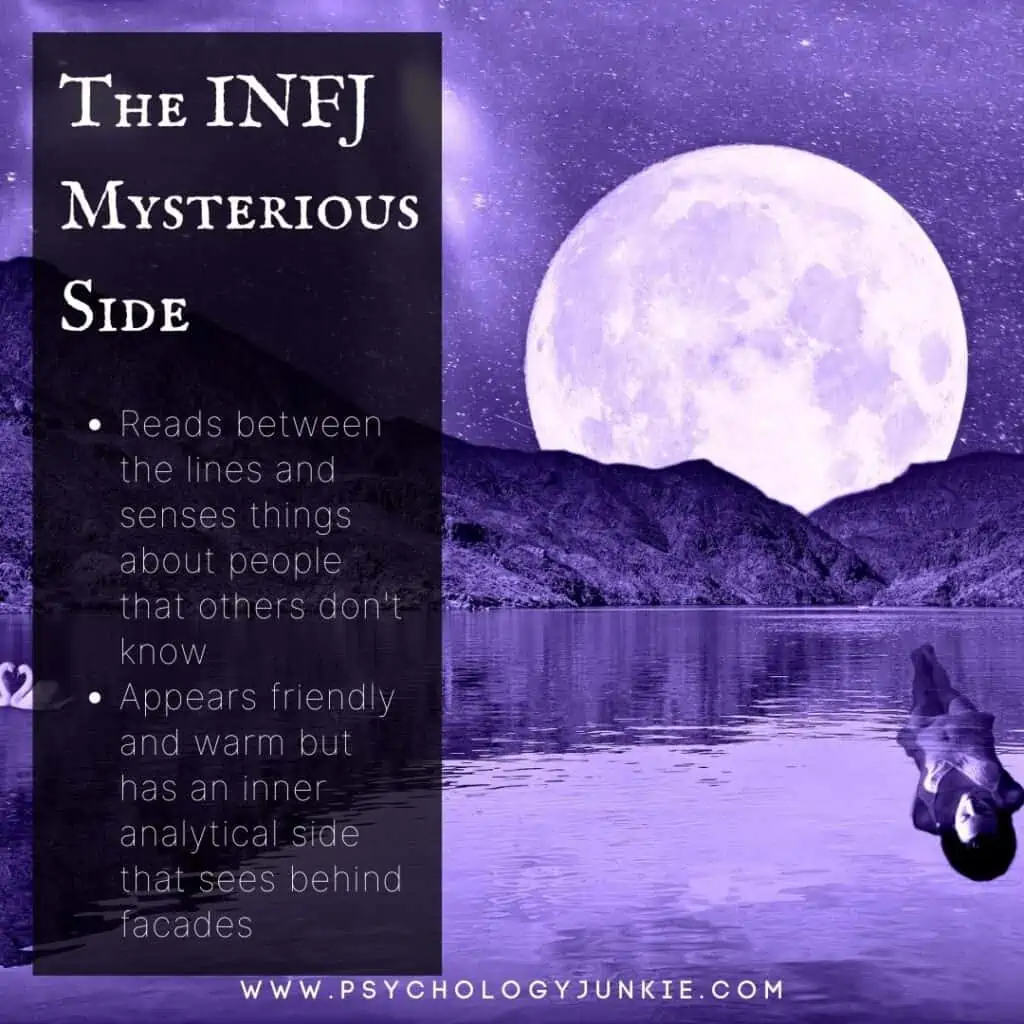
The INFJ is one of the rarest and most misunderstood personality types. These types are often seen as mysterious, daydreamy, and even confusing. However, there’s a lot more to the INFJ than one sees at first glance. Fascinated by patterns and symbols, INFJs are drawn to the hidden meanings in life. They have a strong need to understand the world and their place in it. This desire for knowledge often leads them on a journey of self-discovery that can be both rewarding and difficult. While some types shy away from the darkness of life, INFJs find both the tragic and beautiful facets of life to be fertile areas for understanding and meaning.
INFJs are also highly compassionate people who care deeply about others. They have a strong sense of empathy and can often sense when someone is in need of help, even when that person isn’t aware of it themselves. This compassion often leads the INFJ to put the needs of others above their own, which can result in them feeling overwhelmed and exhausted. The sensitivity of this type is often camouflaged by a friendly countenance. They need a great deal of alone time to detach their own feelings from the feelings and emotional wavelengths of others.
Read This Next: INFJ Personality Profile
The INTJ
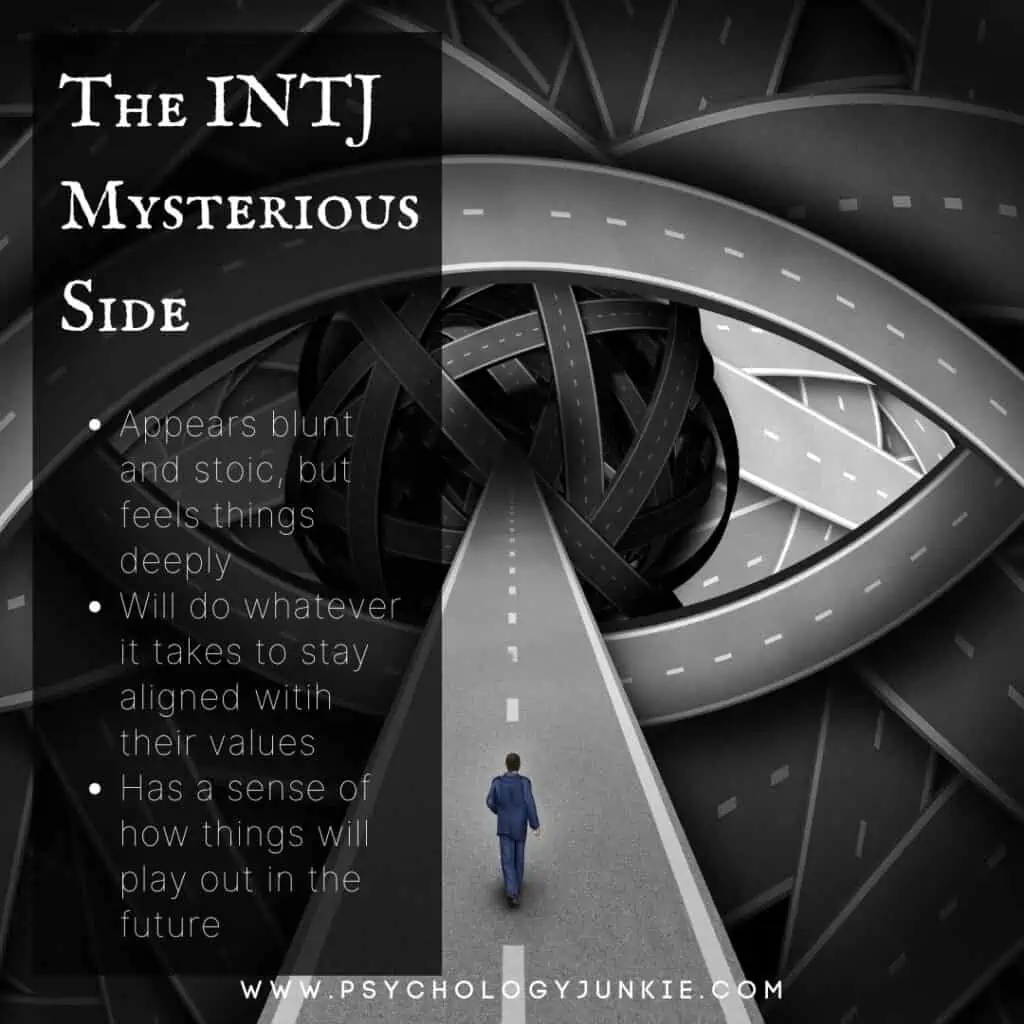
Strategic and focused, INTJs are often the minds behind some of the world’s greatest inventions and plans. They’re highly analytical and logical people who aren’t content to stay with the status quo. Their pioneering minds lead them to see possibilities where others see only dead ends. This ability, combined with their determination and single-mindedness, allows INTJs to turn their vision into reality. Unfortunately, people often misunderstand INTJs and get turned off by their detached and stoic persona.
While INTJs may seem to be all about business, planning, and strategies, they’re also transfixed by the world of the imagination. As dominant introverted intuitives, INTJs have flashes of insight and symbolism that guide them. They are driven to imagine, divine, and find purpose and direction in these inner symbols and insights. And while INTJs may seem cold on the outside, they have a well of inner ethics and passions that drive them. These inner values are deeply important to them which is why it’s not uncommon to find INTJs who are putting their ingenuity behind a cause or speaking out against injustice or unfairness.
Read This Next: INTJ Personality Profile
The ESFP
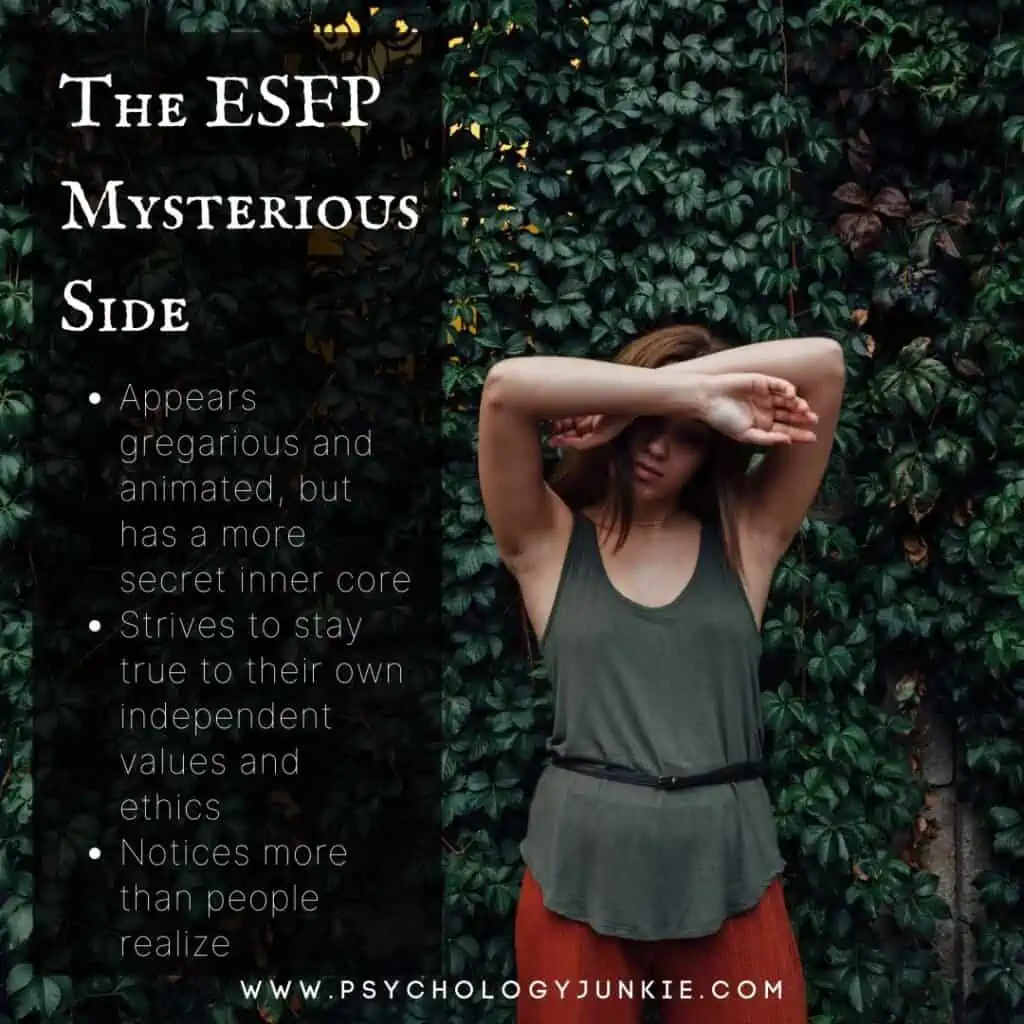
The ESFP is one of the most outgoing and vivacious personality types. They are known for their fun-loving nature and their ability to light up a room with their infectious energy. ESFPs are often drawn to careers in the arts or entertainment due to their love of action, experience, and creativity. And while they may appear to be all about fun and games, there’s a lot more to the ESFP than a desire for amusement.
ESFPs are deeply sensitive people who are concerned with living lives of authenticity. They need to walk their own path and are skeptical of societal pressures and values. This sensitivity also means that they are protective of their innermost feelings. Many people think they know ESFPs because they’re so friendly and enthusiastic, but beneath that sunny exterior is someone who thinks deeply about matters of the heart. Often ESFPs have more depth and emotional richness than people realize, and this can be expressed in their nuanced performances, private journals, or musical playlists.
The ESTP
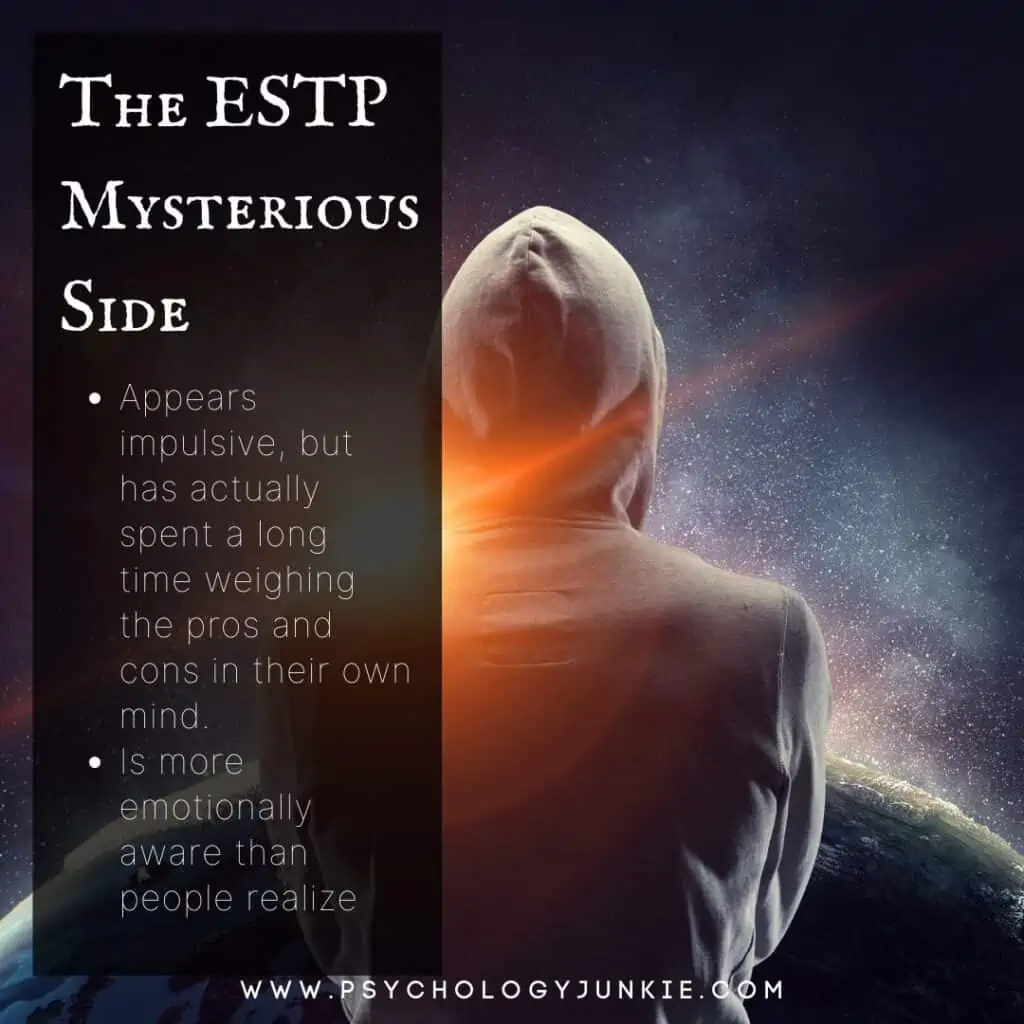
The ESTP is one of the most action-oriented personality types. They are known for their love of adventure and their ability to think on their feet. ESTPs are often drawn to careers in entertainment or entrepreneurship due to their natural ability to improvise and see opportunities and seize them. And while they may appear to be all about competition and winning, there’s a lot more to the ESTP than a desire to come out on top.
ESTPs have a deeply analytical side that weighs pros and cons, finds leverage points, and decides on core principles that he or she will not violate. They also have an eye for emerging opportunities and trust this instinct to guide then without fail. While on the outside ESTPs may appear impulsive and constantly “on,” on the inside there’s a more cautious, considerate way of thinking. ESTPs have a softer and more sensitive side that only their closest loved ones are usually cognizant of. They care about how they affect people and are often more aware of peoples’ emotions than people realize. It’s fairly common for them to impact the mood of others in highly nuanced ways, either by creating harmony, sparking the right laugh at the right time, or amping up the energy of the room to create a more lively experience.
The ISFP
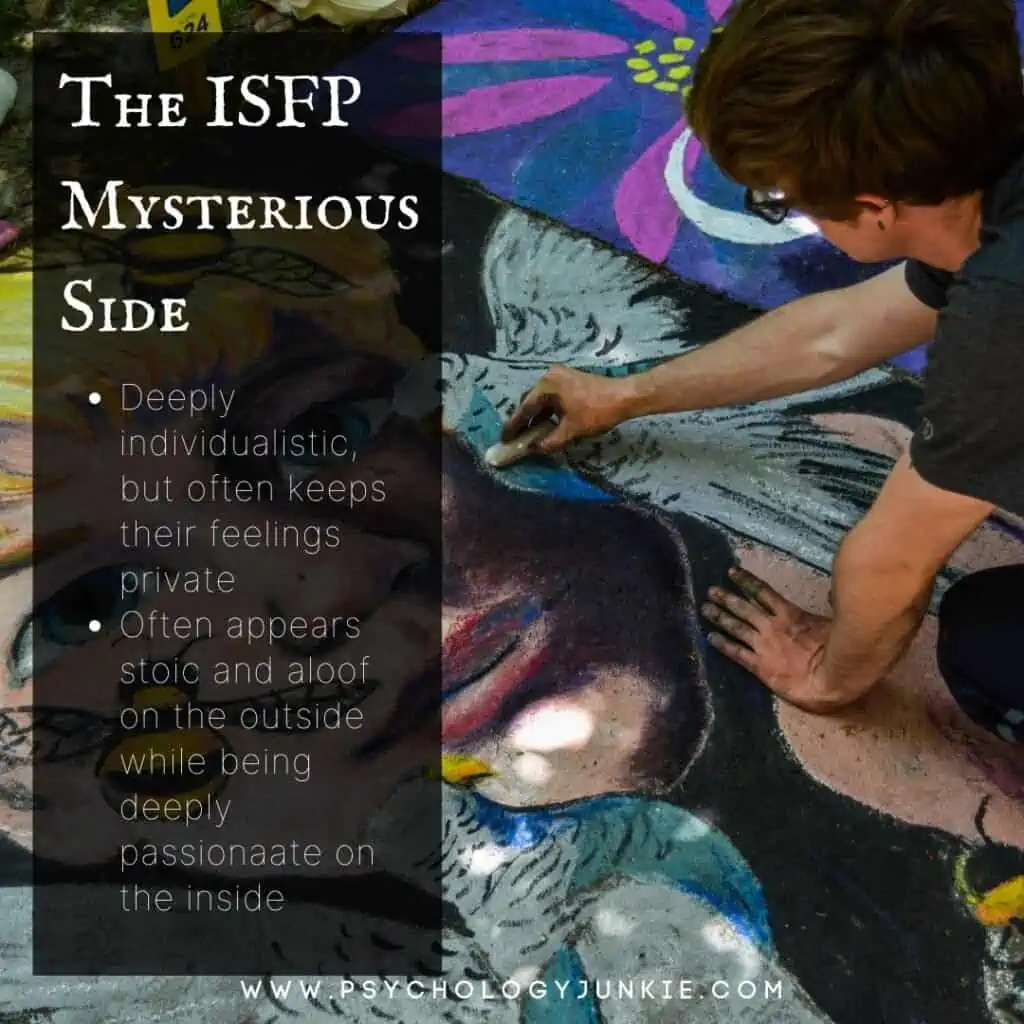
ISFPs are likely one of the most mysterious personality types of the 16 that exist. They rarely show their feelings on the outside, but there are a vast array of rich and nuanced emotions held deeply beneath the surface. These types are individualists in every sense of the word, and they often have a strong creative streak. ISFPs are some of the most passionate people you’ll ever meet, and while they may not be vocal about it, they care deeply about causes and principles they believe in.
ISFPs also tend to be highly observant. They take in the world around them and are constantly processing new data and information. This allows them to see things that others may not, and it also lends to their unique perspectives on the world. ISFPs are often ahead of the curve when it comes to trends and changes, and they’re not afraid to be different. They march to the beat of their own drum and believe strongly in living a life that’s true to themselves. Others are often intrigued and mystified by them, and that air of mystery is something that many ISFPs privately enjoy and find comfort in.
Read This Next: 24 Signs That You’re an ISFP, the Virtuoso Personality Type
The ISTP
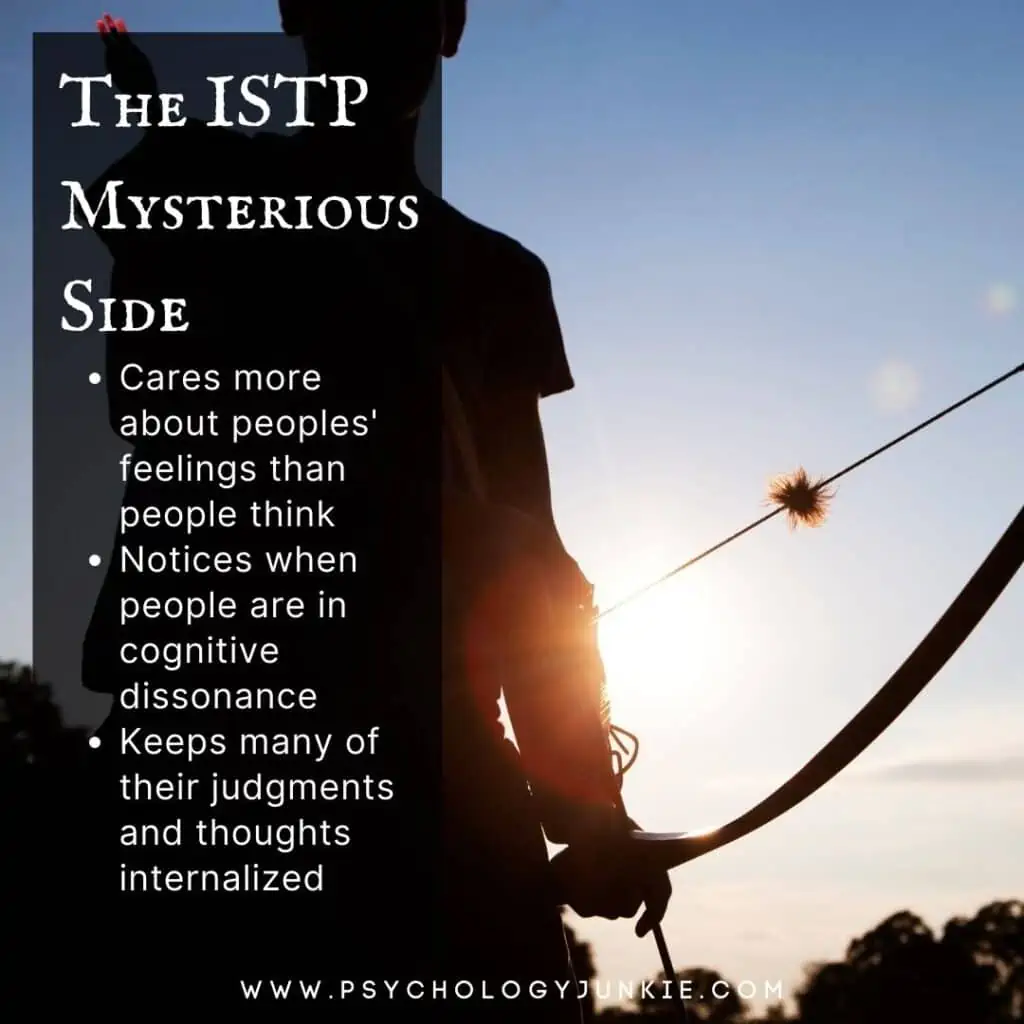
ISTPs are often a mystery even to those closest to them. Their skeptical, highly observant demeanor gives others a feeling that they can’t pull one over on them. There’s a no-nonsense practicality to the ISTP that lets others know that they won’t accept any BS. Many people feel that ISTPs know everything about them while they know hardly anything about the ISTP.
This is largely due to the ISTP’s private nature. They are often reluctant to share their innermost thoughts and feelings, even with those closest to them. This reserve is partly due to the ISTP’s need for privacy and alone time, but it also has to do with the ISTP’s natural skepticism. They don’t feel the need to share everything about themselves with others until they’re sure that it won’t be used against them.
The ISTP is also a highly logical thinker. They are constantly analyzing and processing data, and they have an uncanny ability to see how things work. Logical fallacies and illogical thinking annoy them, and they’ll quickly see all the ways people try to stay trapped in their own cognitive biases. Many people feel exposed around ISTPs because of how quickly they can see through others’ facade. This deep level of insight is something that ISTPs often prefer to keep to themselves, as they know that not everyone can handle the truth.
Read This Next: Understanding ISTP Thinking
The ESFJ
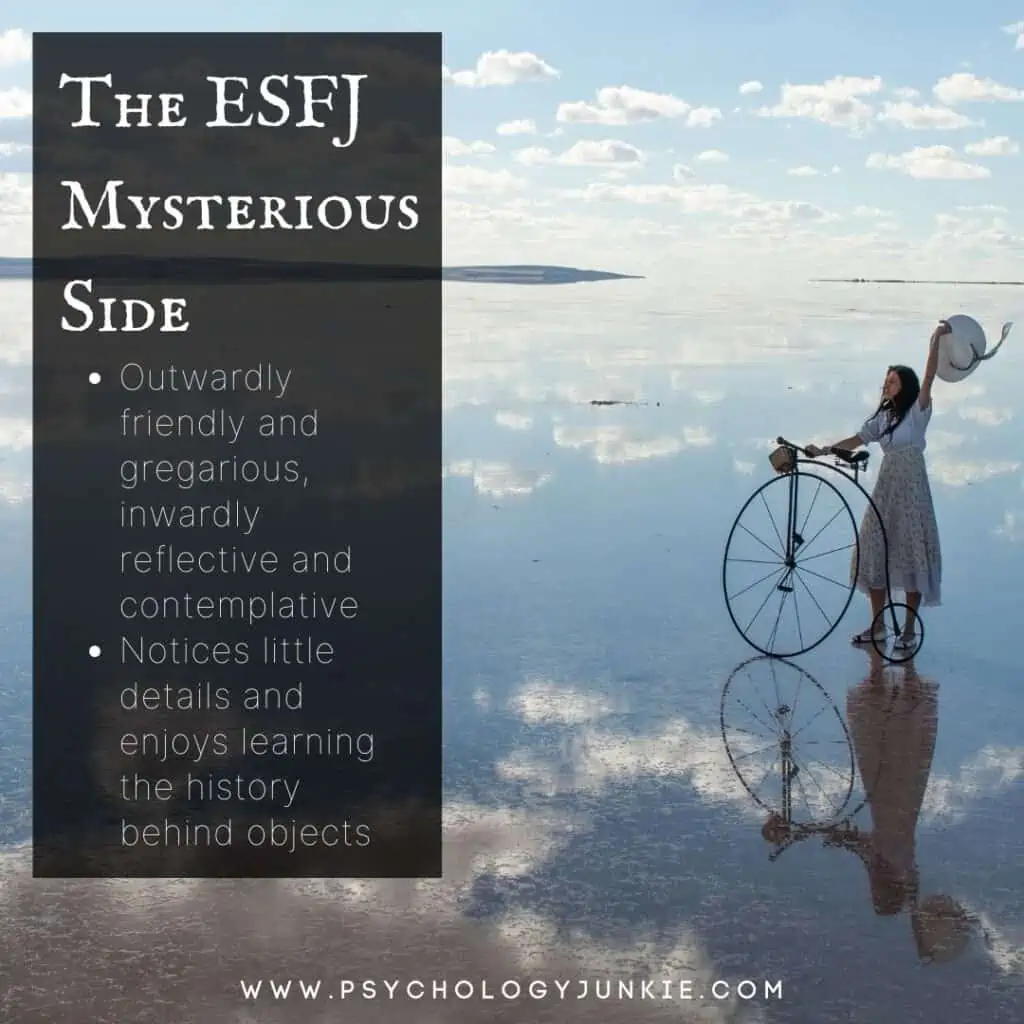
ESFJs are some of the most expressive and group-oriented people you’ll ever meet. They’re quick to show their love and affection for others, and they’re always looking for ways to make those close to them happy. ESFJs have a strong sense of duty and responsibility, and they take their commitments very seriously. They are the type of people who will go above and beyond to make sure their loved ones are taken care of.
But ESFJs aren’t all about hosting and caretaking. There’s a deeply sensitive inner core that drives them. These types see the history and meaning in everything, and they’re always looking for ways to connect the dots. On the outside they may appear like friendly organizers, but on the inside they are insightful souls that are deeply in touch with how all the moments of life tie together to create a unique story. To the ESFJ objects aren’t just objects, they’re symbols and reminders of people, places, and things that have made them who they are. Moments aren’t just stand-alone fragments of time, they are rich tapestries of human emotion and connection. When ESFJs are in a period of reflection they can appear mysterious and even aloof, but this is only because they’re so deeply immersed in the stories and lessons that they’ve collected about their own and others’ lives.
Read This Next: 7 Things That ESFJs Experience as Children
The ESTJ
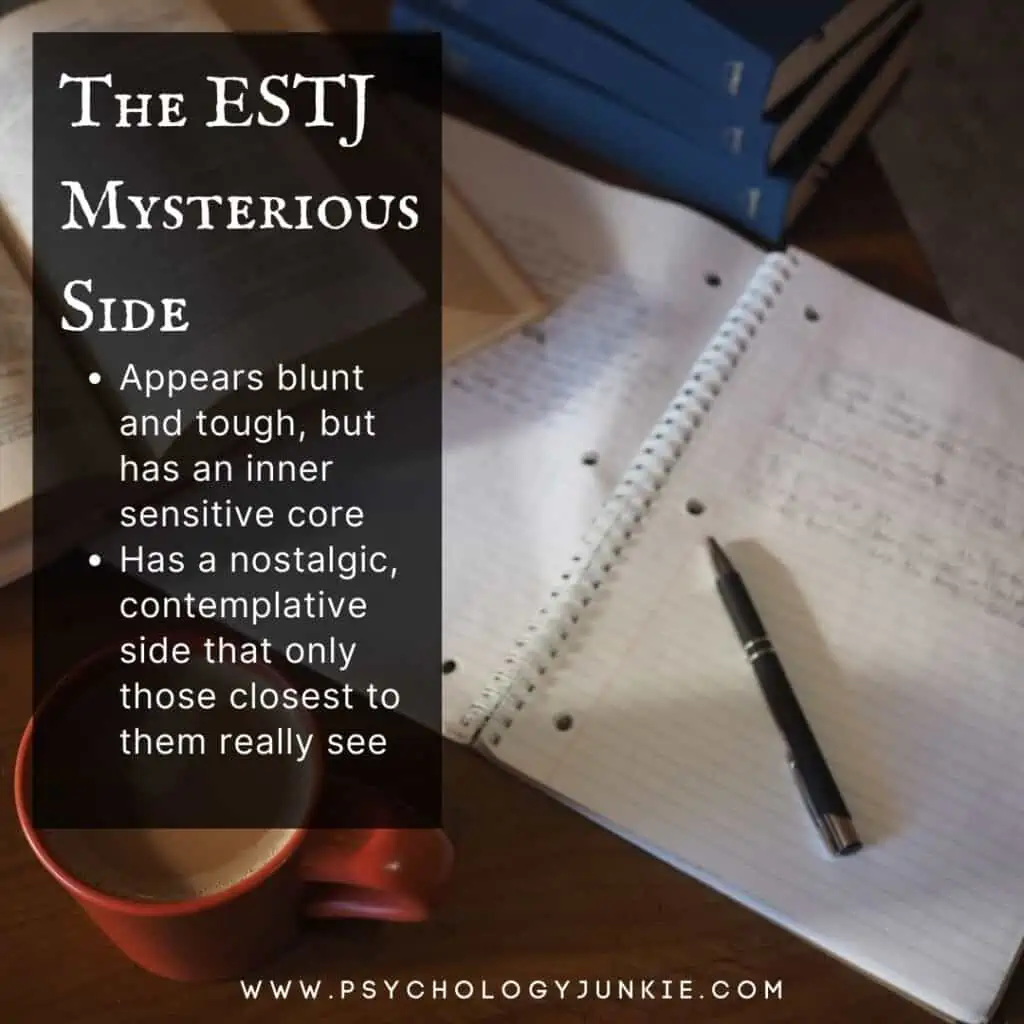
ESTJs are no-nonsense, pragmatic people who like to take charge and make things happen. They live their lives with a strong sense of duty and commitment, and they don’t allow themselves or others to make excuses. ESTJs take their responsibilities very seriously, and they’re not afraid to put in the hard work to get the job done right. Others can count on ESTJs to follow through on their commitments, no matter how difficult or challenging they may be.
A lot of people think they know ESTJs. They appear very no-nonsense, direct, and grounded. But like all extroverts, they have a more private inner core that is mysterious and beautiful. ESTJs, like ESFJs, collect meaningful stories and histories about the world around them. In the quiet moments they enjoy reflecting on the beauty of an experience in their childhood or a place they once visited. To the ESTJ, life is a series of interconnected stories that all teach valuable lessons. They’re more sentimental than people realize and beneath their tough, can-do exterior is a more sensitive, passionate inner soul that has a very individual sense of right and wrong.
The ISFJ
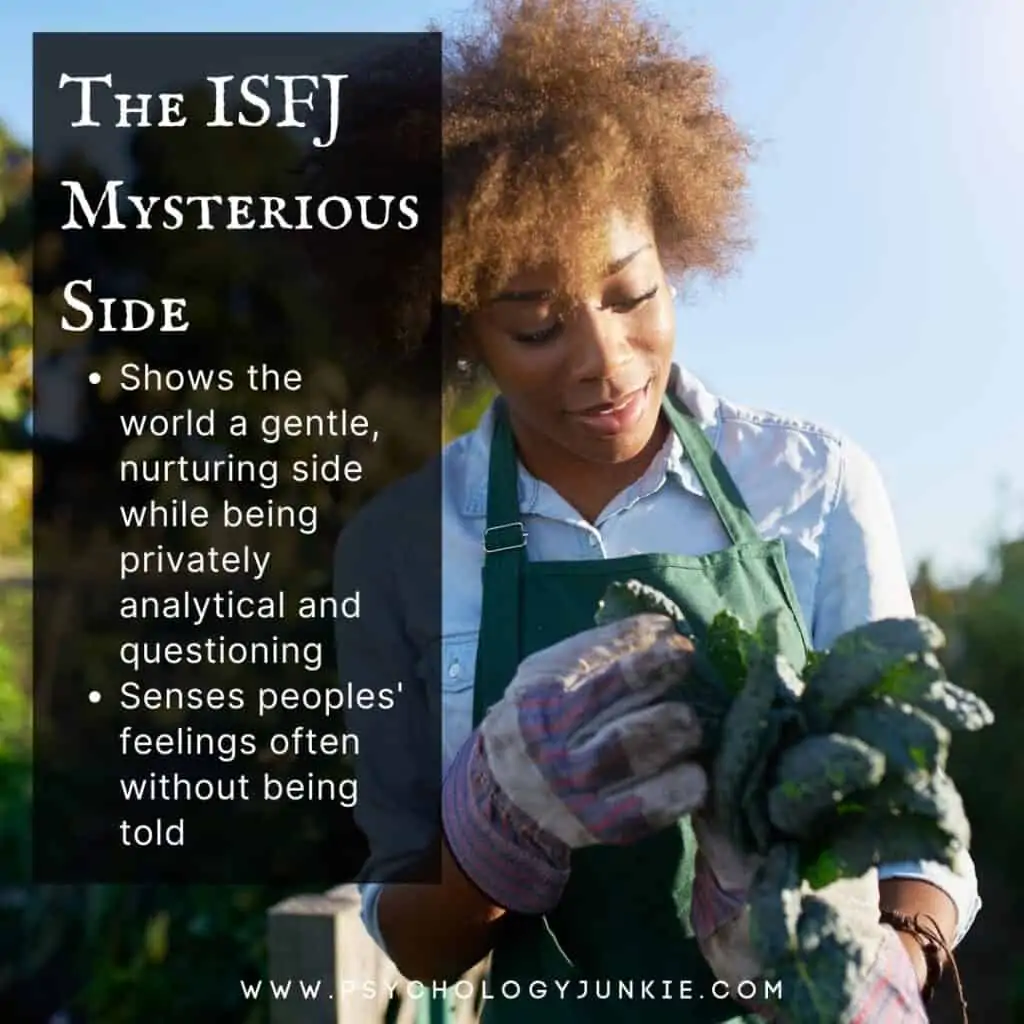
When you meet an ISFJ for the first time, chances are you’ll be taken in by their warmth and friendliness. These types want people to feel comfortable around them and will go out of their way to make others feel welcome. But if you think all an ISFJ amounts to is what they do for others, then you’re sorely mistaken.
ISFJs often feel like time travelers in their own minds. They can glimpse a leaf falling from a tree and instantly be transported to a time when they were children and the world felt full of possibility. Every object in an ISFJ’s home likely is filled with personal meaning and significance. People closest to ISFJs know that there’s another side to them beyond the caretaking side. And this side is deeply private , introspective, and even a little mysterious. ISFJs often have a deep well of emotions that they keep hidden from the world. They’re very in touch with their feelings, but they don’t want to burden others with them. And there’s a sense that they see a rich history and meaning behind things that others barely notice.
Read This Next: 24 Signs That You’re an ISFJ, the Protector Personality Type
The ISTJ

ISTJs are loyal, reliable, and dutiful people. They take their commitments seriously and follow through on their promises. You can always count on an ISTJ to do what they say they’re going to do. They’re the type of people who show up early for appointments and finish what they start.
On the surface ISTJs seem like very serious, grounded people. But what many don’t realize is that ISTJs have a very unique sense of humor. They’re often the ones making deadpan jokes or observational comments that make others laugh. ISTJs also have a more sentimental side that they keep hidden from the world. They have a strong appreciation for meaningful traditions and the lessons of the past, and they often have a deep well of emotions that they don’t express outwardly. Many ISTJs are secret romantics who have a rich fantasy world that they retreat to when they need to escape the hustle and bustle of everyday life. There’s an inner sensitivity and passion that lies just beneath the surface of the ISTJ’s serious, practical exterior. These types place high value on living with integrity and staying true to their values no matter what.
Read This Next: 24 Signs That You’re an ISTJ, the Detective Personality Type
What Are Your Thoughts?
Did you enjoy this article? Did your section resonate with you? Let us and others know in the comments!
Explore more about your personality type in our eBooks, Discovering You: Unlocking the Power of Personality Type, The INFJ – Understanding the Mystic, The INTJ – Understanding the Strategist, and The INFP – Understanding the Dreamer. You can also connect with me via Facebook, Instagram, or Twitter!








How do you come up with this stuff? I’m amazed that you know so much of me yet you don’t know me. To bad I didn’t know this in my younger years. Thanks
On the spot. At least I like to think that it is, being so rich in good values and rational virtues. Thank you. Rui
Am I incorrect here but is the Myer Briggs model not been debunked as its never actually been peer reviewed or scientifically tested I its original form??
Ps sorry for any typos, I’m not wearing g my glasses lol